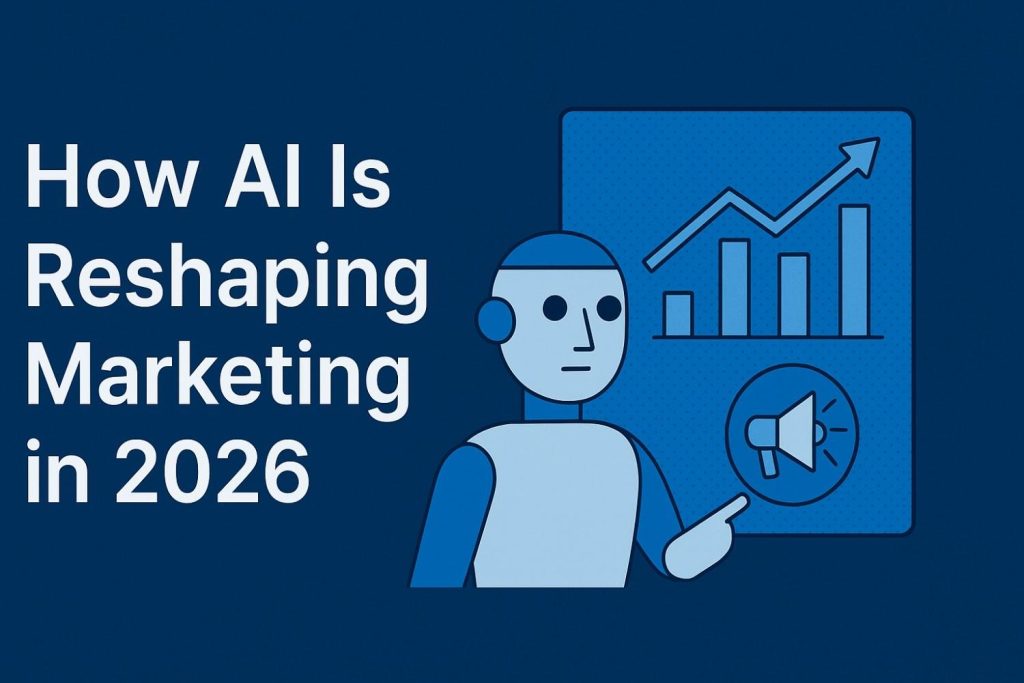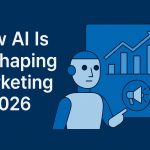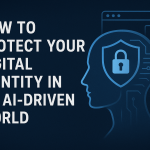Introduction: The New Era of AI in Marketing
The year 2026 marks a turning point in digital marketing. Artificial Intelligence is no longer just a futuristic concept; it has become the backbone of modern marketing strategies. Businesses across industries—from startups to Fortune 500 companies—are integrating AI into every aspect of their campaigns.
AI in Marketing 2026 means much more than chatbots and automation. It’s about personalization at scale, predictive insights, real-time engagement, AI-powered SEO (GEO), and smarter customer experiences. The result? Higher ROI, deeper connections, and faster growth.
In this blog, we’ll dive deep into how AI is reshaping marketing in 2026, with practical examples, strategies, and insights you can implement today.

Why AI in Marketing Matters in 2026
Marketing has always been about understanding people—what they want, how they think, and why they make decisions. In 2026, AI gives marketers unprecedented access to customer behavior patterns.
- 85% of businesses now use AI tools in some part of their marketing.
- AI-driven personalization boosts conversions by up to 300%.
- Generative AI saves content teams hundreds of hours per month.
Simply put, AI is no longer optional. It’s the competitive advantage.
1. Hyper-Personalization at Scale
From Mass Marketing to “Market of One”
In 2026, AI-powered personalization is the gold standard. Instead of targeting broad demographics, AI analyzes browsing history, purchase behavior, location, device, and even emotions to deliver individualized experiences.
- Example: E-commerce platforms create unique homepages for each visitor with tailored product recommendations.
- Example: Streaming services suggest shows based on your mood, not just your watch history.
Why It Works
Customers are overwhelmed with content. Personalized experiences cut through the noise and build trust and loyalty.
2. AI-Powered Content Creation and Marketing
Content at the Speed of Thought
In 2026, Generative AI is central to content creation. From blogs and videos to ad copy and graphics, AI tools can create professional-grade marketing materials in seconds.
- AI Blog Writing: SEO-optimized blog posts generated in minutes.
- AI Video Ads: Automated TikTok or Instagram reels featuring lifelike avatars.
- AI Visual Design: Ads, banners, and infographics tailored to campaign themes.
Human + AI Collaboration
The most successful brands don’t replace humans with AI—they combine AI efficiency with human creativity. Marketers refine, edit, and add personality, making content resonate.
3. Voice Search and Conversational AI
Marketing Moves to Conversations
With smart assistants like Alexa, Siri, and AI-powered chatbots evolving, voice search is dominating 2026. Customers prefer natural conversations over typing.
- Conversational AI Chatbots: Handle up to 80% of customer support on platforms like WhatsApp, Messenger, and Instagram.
- Voice SEO Optimization: Brands optimize for long-tail, conversational keywords like “What’s the best eco-friendly shampoo near me?”
Why Voice AI Matters
It allows brands to connect in real-time, 24/7, improving engagement and satisfaction.
4. Predictive Analytics and Data-Driven Campaigns
From Reactive to Proactive Marketing
AI in 2026 doesn’t just analyze data; it predicts outcomes. Predictive analytics enables marketers to make smarter decisions before launching campaigns.
- Trend Forecasting: AI identifies emerging industry trends.
- Customer Lifetime Value (CLV): AI predicts who your most valuable customers will be.
- Campaign Optimization: AI tools suggest the best timing, messaging, and platforms.
Example
Netflix predicts which shows will succeed before production using AI models trained on viewing habits.
5. GEO: Generative Engine Optimization
SEO Meets AI Search
Traditional SEO is changing. Search engines are now AI-powered assistants (ChatGPT, Perplexity, Gemini), which provide direct answers instead of links.
This shift demands Generative Engine Optimization (GEO)—a strategy to ensure your content is picked up by AI systems.
- Write clear, structured, and authoritative content.
- Use FAQs, schema markup, and conversational language.
- Optimize for contextual queries AI engines prioritize.
6. Emotionally Intelligent AI in Marketing
Marketing with Empathy
AI in 2026 is becoming more emotionally intelligent. Tools analyze tone, sentiment, and context to gauge how people feel about a brand.
- Social Listening: AI tools scan social media for customer emotions.
- Emotional Ads: Campaigns adapt based on how audiences feel in real-time.
- Customer Support: AI agents detect frustration and escalate to human agents instantly.
7. Ethical AI and Data Privacy in Marketing
Balancing Personalization and Privacy
Consumers are more aware of privacy than ever. Regulations like GDPR 2.0 and global AI ethics laws mean businesses must use AI responsibly.
- Transparent Data Policies: Customers demand clarity about data usage.
- Bias-Free AI Models: Marketers must avoid discrimination in ad targeting.
- Sustainable AI Marketing: Reducing carbon footprint of large-scale AI.
Brands that embrace ethical AI marketing stand out as trustworthy leaders.
8. AI in Marketing Automation
Smarter Campaign Management
AI-powered marketing automation tools now manage entire campaigns from start to finish.
- Email Marketing: Personalized subject lines and send times.
- Ad Campaigns: Dynamic bidding and placement on Google Ads and social media.
- Customer Journeys: Automated nurture sequences that adapt based on behavior.
9. AI-Powered Social Media Marketing
Social Media Runs on AI
In 2026, social platforms are almost fully AI-driven ecosystems.
- AI Trend Detection: Find trending hashtags before they peak.
- AI Influencer Matching: Brands partner with influencers through algorithmic matching.
- AI Moderation: Keeps brand communities safe from spam and hate.
Is AI Replacing Marketers?
A big question in 2026: Will AI replace marketing jobs?
The reality: AI is replacing tasks, not people.
- Routine tasks like scheduling, reporting, and keyword research are automated.
- Humans focus on strategy, creativity, and storytelling.
Marketers who embrace AI tools will thrive, while those who resist risk falling behind.
Case Studies: AI in Marketing 2026 Success Stories
- Amazon: Uses predictive AI to recommend products before customers search.
- Coca-Cola: Runs global campaigns generated by AI avatars in multiple languages.
- Nike: Personalizes product designs for customers using AI-generated data insights.
Conclusion: The Future of AI in Marketing 2026
AI is no longer reshaping marketing—it is marketing itself in 2026. From hyper-personalization and predictive analytics to GEO and emotionally intelligent campaigns, AI empowers businesses to create smarter, faster, and more meaningful connections with customers.





